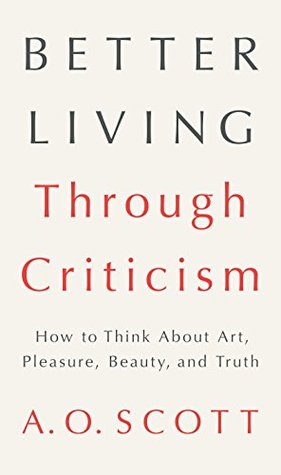More on this book
Community
Kindle Notes & Highlights
by
A.O. Scott
Read between
October 17 - November 1, 2020
It’s the job of art to free our minds, and the task of criticism to figure out what to do with that freedom.
dreams of casting a spell like the one he finds himself under.
The world is enormous. Travel is exhausting. Time travel is impossible. But you can go anywhere, to any period in history, in the pages of a book or sitting in front of a screen, and acquire a more intimate, richer sense of what is found there than you would through classroom study or organized travel. You can get inside feelings and habits.
Aesthetic bliss, in principle universally available, must in practice be contained, limited, even minimized.
The consumer economy is profoundly unequal, raising barriers to entry on the basis of income and access rather than pedigree. And the story of human progress, of opening minds and increasingly cosmopolitan pleasures, is also a tale of loss, of standardization and homogenization.
critics are vermin and their prey is a flower.
A piece of music makes no obvious argument, tells no literal story, soars above politics and history in an ether where logic and feeling coexist interchangeably. When Walter Pater wrote that “All art constantly aspires towards the condition of music,” he was making a claim not only about all art but also about all criticism, whose job is to isolate those attributes of other specimens of art that bring them closest to music and are least burdened with representational duties.
If music is pure form, then criticism is surely its antithesis: pure argument, absolute matter.
James goes on to liken the press to “a regular train which starts at an advertised hour, but which is free to start only if every seat be occupied. The seats are many, the train is ponderously long, and hence the manufacture of dummies for the seasons when there are not passengers enough. A stuffed manikin is thrust into the empty seat, where it makes a creditable figure till the end of the journey.”
And the logic of trade—of the commodity form—declares all content to be equivalent.
Metrics can be applied to circulation—copies sold, advertising rates, page views—but everyone who actually reads knows that the essence of written discourse is qualitative.
“Making a living is nothing,” Elizabeth Hardwick declared in the first sentence of an essay called “Grub Street: New York,” which was first published in 1963 in the inaugural issue of the New York Review of Books. “[T]he great difficulty is making a point, making a difference—with words.”
The professional is the one who does not do it for free, but also the one who does not do it only for money—the
a critic is a person whose interest can help to activate the interest of others.


